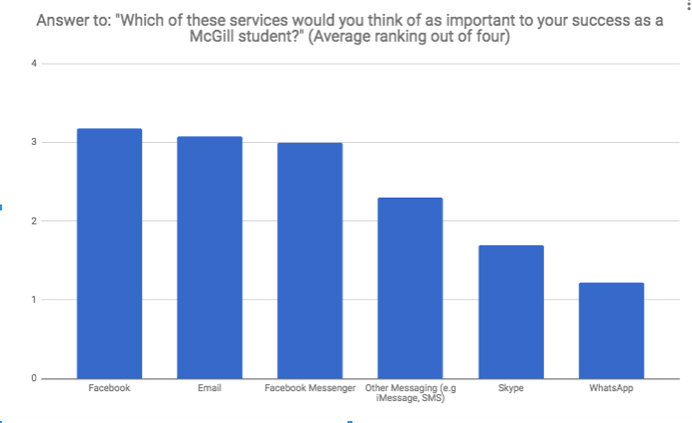Amid an international movement to delete Facebook and outcry from McGill first years who have not been able to join the McGill Facebook community, recent survey data found that students rely on the site for their academic success. According to a survey The McGill Tribune distributed from April 2 to 4, students use Facebook for academic purposes more frequently than dedicated messaging apps like SMS, iMessage, and Skype.
The survey found that 100 per cent of its 41 respondents use Facebook; 98 per cent of students use Instagram, which Facebook owns; 85 per cent of students use Snapchat, and 44 per cent of students use Twitter. Students’ preference for Facebook messenger over iMessage supports the worldwide trend away from dedicated messaging apps to more holistic chat-over-data services that provide direct messaging in addition to other features, such as stories and post-creation.
Although respondents ranked Facebook equally as important as email to their professional success, students expressed continued frustration with McGill’s lack of action over managing its Facebook community. A widespread glitch has prevented some new students from using their McGill emails to become members of the community, meaning that they are unable to join Facebook groups such as “Free-And-For-Sale,” in which students offer to buy and sell their used goods, groups organized for each of McGill’s graduating and entering classes, and groups that serve extracurricular clubs and student organizations on campus.
As a result, over 800 disgruntled freshmen joined a Facebook group dedicated to forging an alternate space to network and raising awareness of first years’ inability to access McGill’s Facebook community.
“It would be nice if groups didn’t require a ‘valid McGill email,’” Dezso Lovicsek, U1 Arts, said. “I’m part of the large group of forgotten freshmen, so I am excluded from most groups, from frosh groups to class pages.”
While Facebook provides Groups for Schools to help universities organize their online communities, the social networking service is not responsible for managing the groups, meaning that the onus is on McGill to determine who is admitted. In the survey, respondents expressed frustration at McGill for failing to address the Facebook glitch. Khaled Bucheeri, an engineering student, suggested that McGill should consider using an alternative platform for its groups.
“[An] alternative to [the] McGill Facebook community wouldn’t lock out people who need important services such as the Housing and Free & For Sale groups,” Bucheeri wrote in the survey.
Despite receiving multiple complaints and suggestions from students, McGill IT has denied any responsibility for managing the McGill Facebook group.
“We are unable to comment on this issue as this does not involve McGill IT services,” McGill IT wrote to the Tribune. “Facebook’s McGill community is not affiliated with nor endorsed by McGill.”









